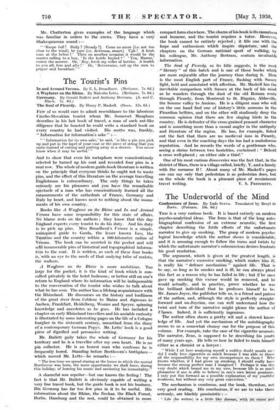The Tourist's Pins
Black. 7s. 6d.) The Soul of Picardy. By Henry P. Maskell. (Bean. 12s. ficl.) FEW of us would care to_ admit resemblance to the laborious
CZecho-Slovakian tourist whom Mr.. Somerset Maugham describes in his last book of travel, a man of such ant-like diligence that he boasted he could write a standard book on every country he had visited. His motto ,was, frankly, ". Information for information's sake "—.., _
" Information for its own sake,' ho said, is liko a pin you pick up and put in the lapel of your coat or the piece of string that you untie instead of cuttind and putting away in a drawer. 'You never know when it may be useful.'" And to show that even his metaphors were conscientiously selected he turned up his coat and revealed four pins in a neat row. The whole of modem guide-book literature is written
on the principle that Cveryone thinks he ought not to waste pins, and the effect of this literature on the average travelling
Englishman is extraordinary. The, only things he takes seriously are his pleasures and . you 'have- .the remarkable giectacle of a man Who has conseientionsbr learned all the measurements of the cathedrals of France, Germany and Italy by heart, and knows next to -nothing -about -the -monu- ments of his own country,-, .•
Books like A Wayfarer on the Rhine and In and Around Verona have some responsibility for this state of affairs. NO blame rests on the authors ; they know that this day
Ei.igland expects. every tourist to do his duty. And his. duty is to pick up .pins. Miss Broadbent's Verona is a simple, urihispired guide to Garda, the lesser known Iseo, the Tientino and the country within a 100-kilometre radius of Verona. The book can be secreted in the -pocket and will acrd innumerable pins of historical and topographical informa- tion to the coat. It is written, as each of these four books
is,'with an eye to the needs of that undying tribe of zealots, the walkers. .
A Wayfarer on the Rhine is more ambitious. Too large for the pocket, it is the kind of book which is con- sulted privately in the hotel bedroom ; or better still on one's
return to England where its information will be indispensable to the conversation of the tourist who wishes to talk about whist he has seen. The author has a lifelong acquaintance with the Rhineland. He discourses on the history and lordliness of the great river from Coblenz to Mainz and digresses to Aachen, Frankfurt,_ Heidelberg, Worms and Speyer, spinning knOWledge and anecdotes as he goes. He has included a chapter on early Rhineland travellers and his amiable curiosity is illustrated by some interesting pages on the life of a Cologne burgher in the sixteenth century, unearthed from the diary of a contemporary German Pepyia. Mr. Letts' book is a good piece of dignified and persuasive writing.
Mr. Bullett gaily takes the whole of Germany for his territory and he is a traveller after my own heart. He is no pin collector. He is an honest man who confesses he is frequently bored. Standing before Beethoven's• birthplace— which moved Mr. Letts—he remarks :—
"The less time we spend staring at the house in which the mortal Beethoven was born, the more opportunity we shall have, during this holiday, of hearing his music and savouring his immortality.
A shameful non sequitur—but one knows the feeling.! The
fact is that Mr. Bullett is obviously capable of writing a very fine travel book, but the guide book is not his business. His Germany has far too few pins in it to be useful. His information about the Rhine, the Neckar, the Black Forest, Berlin, Hamburg and the rest, could be obtained in more
• compact form .elsewhere _The charm of his book iaits casualness and humour, and the -tourist requires a tutor. However, the book cannot be entirely rejected ; it fills one with the hope and enthusiasm which: inspire : departutre,:and the chapters on the German national- aport. of walking, by his colleague, Mr. Anthony Bertram, contain invaluable , information.
The Soul of Picardy, as .its title suggests, is the most . " literary" of this batch and is one of those books whieh are more enjoyable after the journey than during it. Here is the most English part of France, flashing with Sussex light, held and annotated with affection. Mr. Maskell has the inevitable comparison with Sussex at the back of his mind as he wanders through the dust of the old Roinan route through Picardy, from Montreuil to St. Riquier, Abbeville, the Somme valley to Ainiens. He is a diligent man who will on the one hand find one of history's little sermons in the Picardian belfries, and on the other will studiously deny the common opinion that there are few singing birds in the country. He is defender, of the cross-grained peasant character and is something more than a casual angler in-the antiquity and literature of the region. He has, for example, fished out the fact that there are no medieval inns in Picardy, and that even in the cOaching days the inn had a malodorous reputation. And he records the words of a gentleman who, seeing n shrine between two hostelries, exclaimed: "Behold a cross well-placed ; on either side a thief." - One of his most curious discoveries was the fact that, in the district of Ham, there is a village called, briefly, Y, and a family with the surname B! About many of Mr. Maskell's pages one can say only that pedestrian is as pedestrian does, but on the whole the book is a pleasant piece of reminiscent














































 Previous page
Previous page